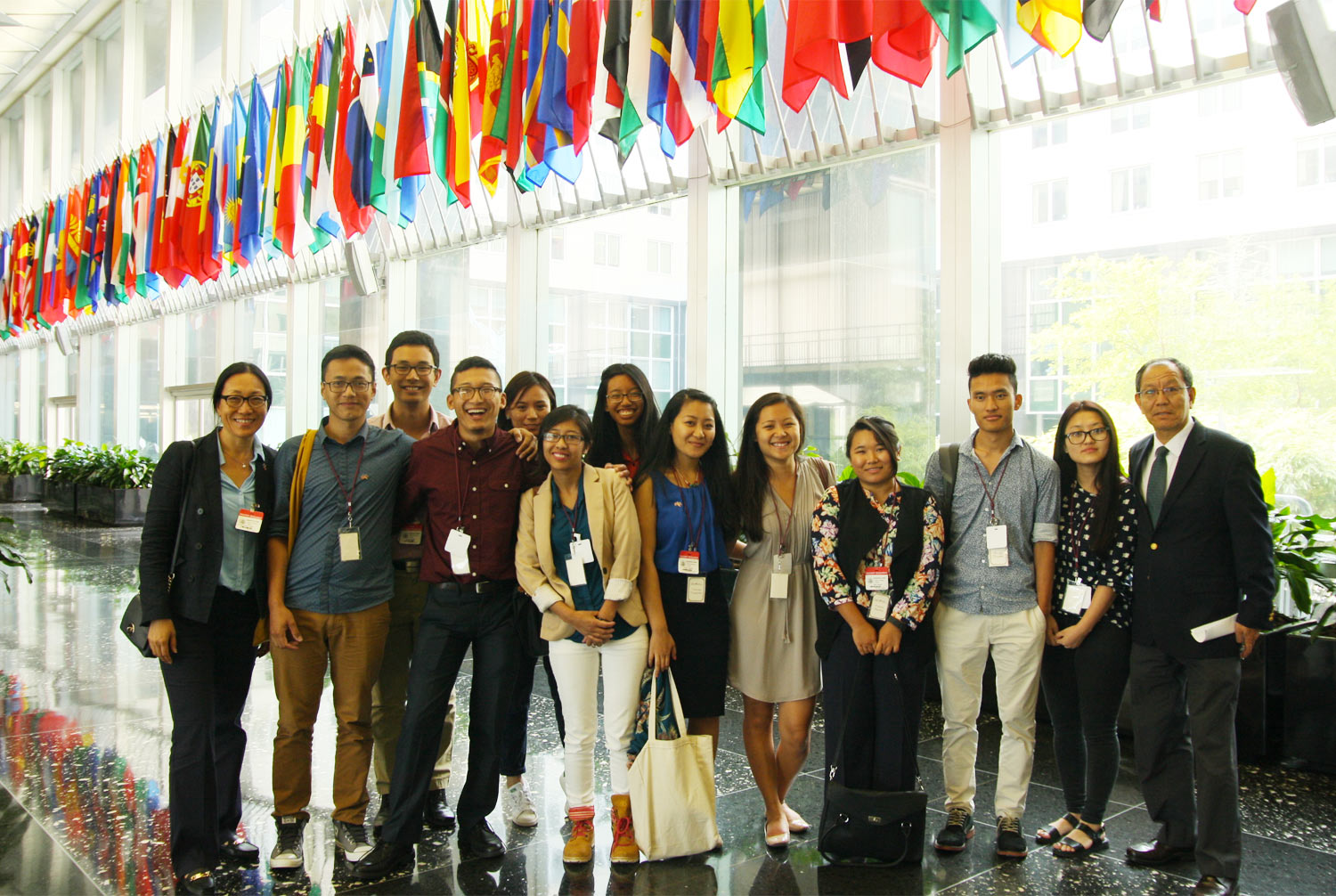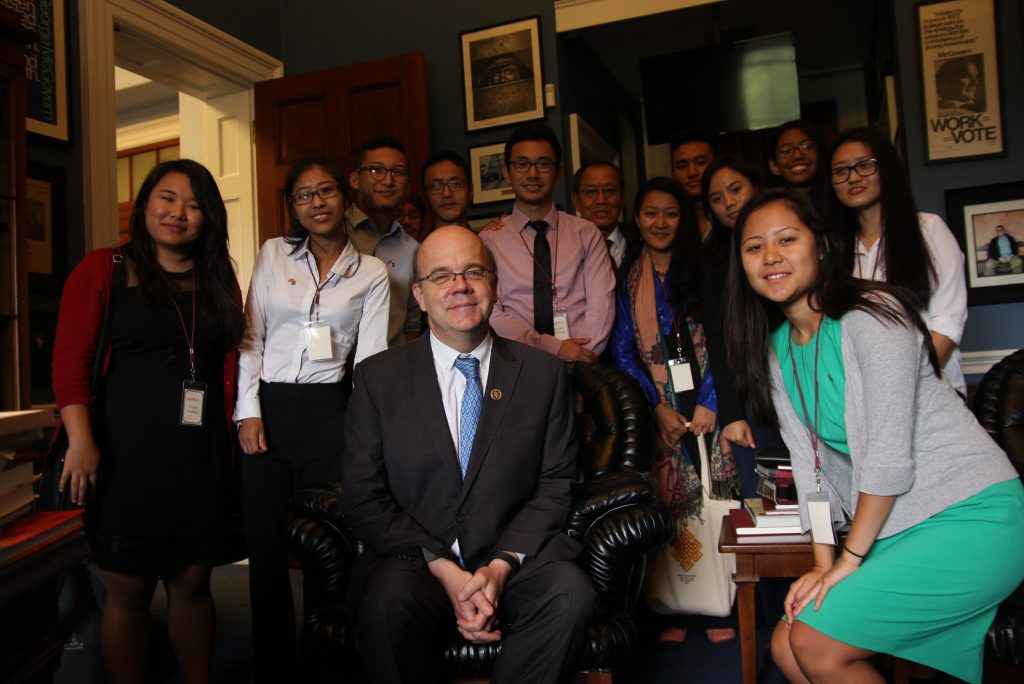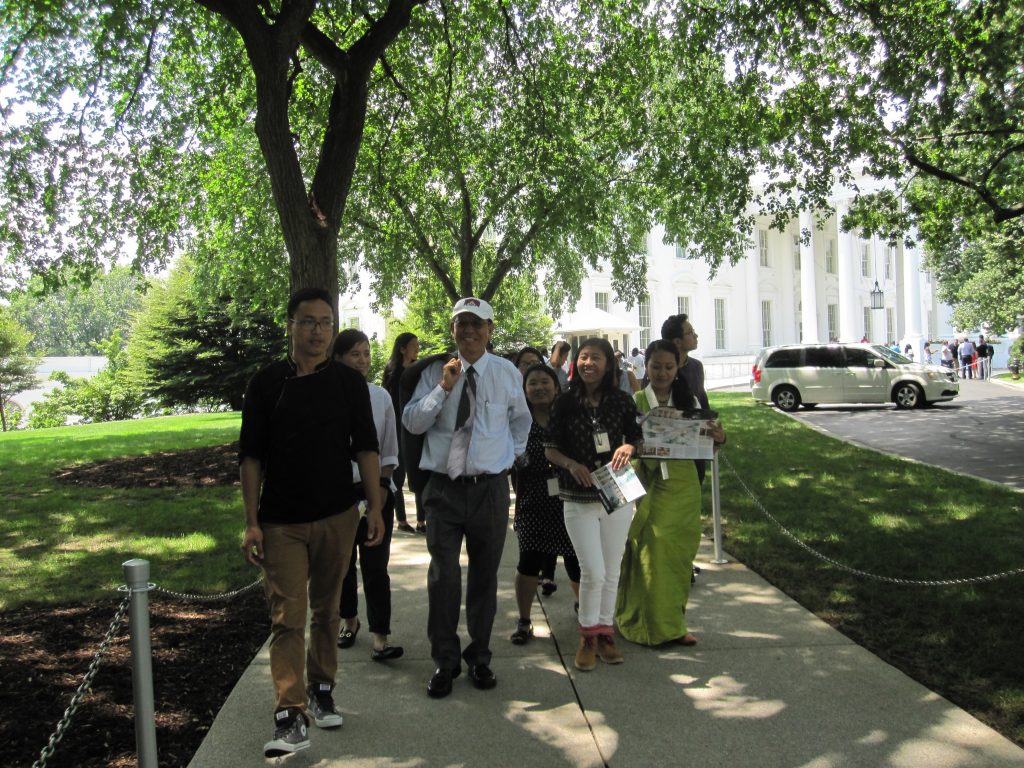By: Passang Gonrong

Participants of ICT’s 2016 Tibetan Youth Leadership at the US State Department.
This year’s cohort came from seven states across the country with ages ranging from 19 to 26 years old. There were students who were born and raised in Tibet, students who were born and/or raised in India and Nepal, and students who were born and/or raised in America. Although we all had the identity of being Tibetan, our diverse backgrounds allowed us to learn greatly from each other. For me, as a Tibetan born in America, hearing stories from my peers who had escaped from Tibet and those who were raised in India and Nepal were eye opening. Each one of us brought something different to the table. We were united in not only our identity of being Tibetan, but a shared goal of wanting to become future leaders in the Tibetan community.
We arrived to the capitol on the fourth of July and were lucky enough to see the red white and blue fireworks on the national mall underneath the Washington Monument. It was a magical start for our week ahead where we were learned the importance of not only our Tibetan identity, but our American identity. Bhuchung la, the vice president of International Campaign for Tibet (ICT), stressed that as Tibetan-Americans we have the right and privilege to advocate for Tibet to our representatives in the American government. Our Tibetan- American identity is important because we have the opportunity to help our brothers and sisters in Tibet through this country. This information was valuable to me because I had always compartmentalized my identity. I was a proud Tibetan and I was a proud American but I did not think those two were entwined. It was during our mini lobbying day on capitol Hill that made me realize how mistaken I was. We had the honor of meeting with Congressmen, Jim McGovern, and Congresswoman, Betty McCollum, who both went on the Congressional Delegation to China and Tibet with Democratic Leader Nancy Pelosi. Both of these representatives, along with the others we met during the day, demonstrated to me the duty we, Tibetan Americans, have to champion for Tibet. Members of Congress would not have heard or supported Tibet if it were not for His Holiness the Dalai Lama, the persistent Tibetan Americans, and the numerous pro-Tibetan organizations reminding Congress how important these issues are to their constituents.
 Our week was packed with visits to the State Department where we able to attend a media briefing, have an interactive session with Ambassador David Saperstein, and meet with Mr. Todd Stein, a senior advisor to the Under Secretary of State for Civilian Security, Democracy, and Human Rights and concurrently serves as special coordinator for Tibetan issues. We had the opportunity to visit the Tibetan Language Service for both Radio Free Asia and Voice of America where some of my peers were interviewed on air. We went on a White House Tour, had a meeting with the President of the National Endowment for Democracy, and also met Representative Kaydor Aukatsang la during our visit to the Office of Tibet. These were just the few things we were able to do in our busy week.
Our week was packed with visits to the State Department where we able to attend a media briefing, have an interactive session with Ambassador David Saperstein, and meet with Mr. Todd Stein, a senior advisor to the Under Secretary of State for Civilian Security, Democracy, and Human Rights and concurrently serves as special coordinator for Tibetan issues. We had the opportunity to visit the Tibetan Language Service for both Radio Free Asia and Voice of America where some of my peers were interviewed on air. We went on a White House Tour, had a meeting with the President of the National Endowment for Democracy, and also met Representative Kaydor Aukatsang la during our visit to the Office of Tibet. These were just the few things we were able to do in our busy week.
One of the most meaningful sessions for me was when it was just us and Bhuchung la. We were able to reflect on the programs we attended during the week and come up with solutions that focused on Tibet and Tibetans through the lens of the American government. The conversations that were discussed during the session and throughout the week were stimulating and engaging. Each one of my peers were motivating, thoughtful, and encouraging. I am excited to see the inspiring things they will do in the future. On the other hand, the main reason we were able to have such an open dialogue was because of our coordinators, Bhuchung la and Tencho la, who created a space that encouraged growth and ideas. We were able to freely share these ideas without being intimidated or afraid to ask questions. This is why I think TYLP is so successful.
 I highly urge every Tibetan college student to apply to the Tibetan Youth Leadership Program. The knowledge and friendships I have gained this week will be everlasting. The International Campaign for Tibet has created a unique and valuable program granting young Tibetans access to learn more about their identity and how to become leaders in the Tibetan American community.
I highly urge every Tibetan college student to apply to the Tibetan Youth Leadership Program. The knowledge and friendships I have gained this week will be everlasting. The International Campaign for Tibet has created a unique and valuable program granting young Tibetans access to learn more about their identity and how to become leaders in the Tibetan American community.
